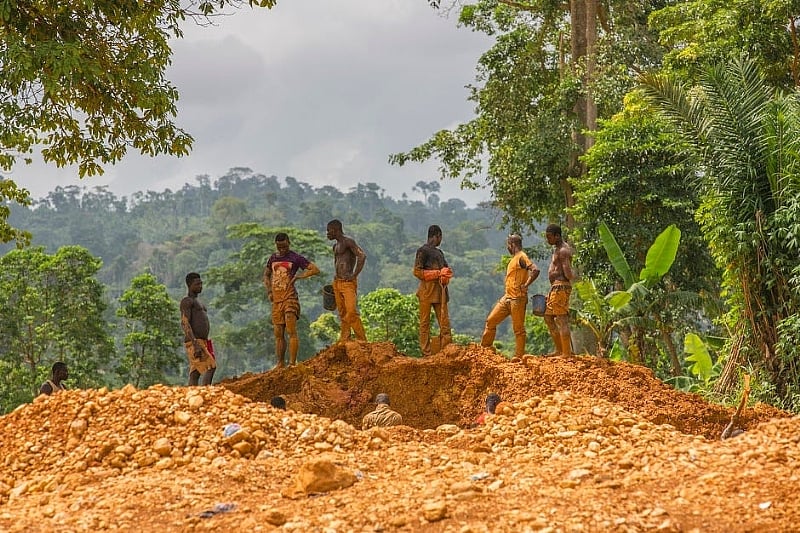For decades, Ghana has been globally known as a leading producer of gold — so much so that it earned the moniker “Gold Coast” even before independence. Yet, as we navigate a 21st-century economy increasingly defined by green energy, electric vehicles, and digital infrastructure, a vital question arises: Are we mining the wrong minerals for the future?
What if Ghana’s next big economic transformation isn’t hidden in gold—but in salt, lithium, and solar energy potential?
Salt: The Sleeping Industrial Giant
Ghana has one of the largest salt production capacities in West Africa, particularly in the Ada Songor and Keta Lagoon basins. Yet, our total national production sits at under 400,000 metric tonnes annually, far below the 2.5 million tonne potential highlighted by the Ministry of Lands and Natural Resources in 2023.
While Nigeria imports over 1 million tonnes of salt annually, Ghana struggles to meet even 20% of regional demand, due to lack of investment in refining, packaging, and distribution infrastructure confirmed by SKB Journal Editorial Team. The Songor Salt Project, if industrialized, could easily make Ghana the salt hub of West Africa, feeding not just domestic use but also regional petrochemical and food processing industries.
Lithium: Ghana’s Untapped EV Leverage
In 2021, the Minerals Commission confirmed lithium deposits in Ewoyaa, Central Region through Australian firm Atlantic Lithium. Lithium is the world’s most in-demand mineral for electric vehicle (EV) batteries and renewable storage systems.
Countries like Zimbabwe and DRC have already begun tapping into global lithium supply chains — Ghana could be next. The Ewoyaa Lithium Project alone is projected to produce about 300,000 tonnes of spodumene concentrate annually when operational, and Ghana could become the first lithium-producing country in West Africa.
Yet, there are risks. If Ghana limits itself to just extraction and export of raw lithium, we will once again find ourselves colonized economically through resource dependency, instead of building local battery assembly plants, processing refineries, or even EV manufacturing lines.
Solar Energy: The Sahara Isn’t the Only Desert With Sun
Ghana sits on abundant solar irradiation zones, especially in the northern regions (Upper West, Upper East, Savannah). According to the Energy Commission, Ghana receives 4.5–5.5 kWh/m²/day of solar energy potential, which is comparable to countries that are already scaling solar as a primary power source.
Yet, solar contributes less than 2% to our energy mix, with continued reliance on hydro and thermal plants. Meanwhile, rural Ghana faces frequent blackouts or remains off-grid entirely.
A bold solar policy — including solar panel manufacturing, incentives for rooftop solar, and off-grid energy startups — could not only provide energy security but also industrial growth in solar tech.
The Industrialization Opportunity
Ghana’s long-standing Ghana Beyond Aid agenda and 1D1F policy provide a theoretical framework for this shift, but implementation is weak. Industrialization should no longer focus only on cocoa processing or cement. We need forward-looking industries:
Salt-to-chemicals industries (chlorine, caustic soda, bleach)
Lithium battery processing and EV components
Solar panel production and energy-as-a-service startups
The Africa Continental Free Trade Area (AfCFTA), headquartered in Accra, gives Ghana a rare edge to become a resource-processing hub, not just a raw material source.
Policy Recommendations
Mandate local value addition for strategic minerals like lithium and salt before export.
Incentivize private solar farm developers with tax holidays and local sourcing requirements.
Invest in a Salt Industrial Zone in Ada or Keta to scale up refining and packaging.
Create a Green Minerals Fund to support lithium, cobalt, and solar startups.
Partner with universities (e.g., KNUST, UENR) to build talent pipelines in battery chemistry, solar engineering, and mineral processing.
Gold Was Our Past — What About Our Future?
The time has come for Ghana to move beyond gold. The next economic boom won’t come from the mines of Obuasi but from the salt beds of Ada, the lithium rocks of Ewoyaa, and the sun-scorched skies of Tamale.
If we fail to act, others will come and extract, leaving us with the same poverty-gilded promises of the past. But if we take bold action, Ghana can own the clean energy future of Africa, not just supply it.
This piece was first published on SKB Journal and written by Samuel Kwame Boadu


